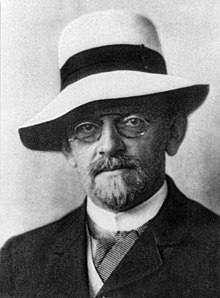
Back David Hilbert Afrikaans David Hilbert ALS ዳቪት ሕልበርት Amharic David Hilbert AN ديفيد هيلبرت Arabic ديفيد هيلبرت ARZ ডেভিদ হিলবাৰ্ট Assamese David Hilbert AST David Hilbert Azerbaijani داوید هیلبرت AZB
David Hilbert (/ˈhɪlbərt/;[3] German: [ˈdaːvɪt ˈhɪlbɐt]; 23 January 1862 – 14 February 1943) was a German mathematician and philosopher of mathematics and one of the most influential mathematicians of his time.
Hilbert discovered and developed a broad range of fundamental ideas including invariant theory, the calculus of variations, commutative algebra, algebraic number theory, the foundations of geometry, spectral theory of operators and its application to integral equations, mathematical physics, and the foundations of mathematics (particularly proof theory). He adopted and defended Georg Cantor's set theory and transfinite numbers. In 1900, he presented a collection of problems that set a course for mathematical research of the 20th century.[4][5]
Hilbert and his students contributed to establishing rigor and developed important tools used in modern mathematical physics. He was a cofounder of proof theory and mathematical logic.[6]
- ^ Weyl, H. (1944). "David Hilbert. 1862–1943". Obituary Notices of Fellows of the Royal Society. 4 (13): 547–553. doi:10.1098/rsbm.1944.0006. S2CID 161435959.
- ^ David Hilbert at the Mathematics Genealogy Project
- ^ "Hilbert". Random House Webster's Unabridged Dictionary.
- ^ Joyce, David. "The Mathematical Problems of David Hilbert". Clark University. Retrieved 15 January 2021.
- ^ Hilbert, David. "Mathematical Problems". Retrieved 15 January 2021.
- ^ Zach, Richard (31 July 2003). "Hilbert's Program". Stanford Encyclopedia of Philosophy. Retrieved 23 March 2009.
